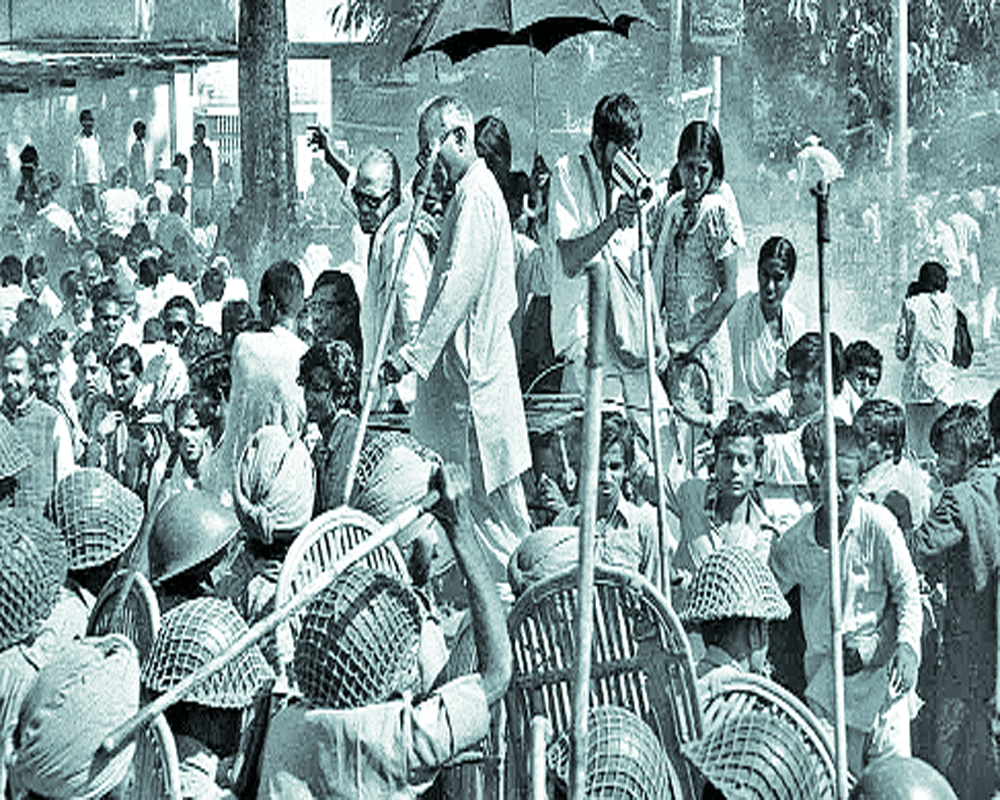The Emergency is etched in the memory of the nation as its darkest hour. Many individuals paid the price of upholding democracy and its values
In the Independent history of India, June 25, 1975, was the darkest day, which will haunt generations to come. The direct consequence of the Emergency was the suspension of various democratic rights. Many draconian laws were enacted during this period, posing a serious threat to democratic values. It adversely impacted civil liberties. All the fundamental rights listed in Articles 36, 37, 38, 39, 40, and 42 were suspended. Fear was all-pervasive. Uncertainty had gripped us. The entire country had become a de facto prison.
At that time I was working as a Rashtriya Swayamsevak Sangh (RSS) Pracharak for Nizamabad and Adilabad zone, belonging to the erstwhile state of Andhra Pradesh, now in Telangana. I had come to know that all my colleagues had been arrested. The Lok Sangharsh Samiti had been formed to carry out the agitation against Emergency. JP Narayan was spearheading the movement.
I used to wear a kurta and pyjamas but had to go to pants, a shirt, coat and tie. I did not go for any haircut. I changed my name to Dharmendra and went underground and kept mobilising people for agitation against the Emergency. At that time all newspapers were censored and only government news was published. So, we started a bulletin with facts and distributed it among the people secretly.
I would like to share with readers some incidents and horrible experiences we underwent during the Emergency. We had called some people to gather at Ramalaya temple in Nizamabad for a secret meeting. It was also an occasion to celebrate the marriage of engineer Venkatshwar Reddy. Around 300 people came.
I and ABVP worker Indrasen Reddy alias Jaan were getting ready for the meeting. But cops in devotees’ clothes were looking for us. They inquired from the people what was going on, and were told that Satyanarayna Vratha had been organised. When we moved towards the meeting hall, they followed us. Left with no option, I and Reddy jumped off from the 20ft temple wall. Though Reddy was alright, I sustained an ankle injury.
I and Indrasen Reddy ran away to a bus stop 20 km away. We reached our secret place in Hyderabad from Medak district, now in Telangana. At the temple, police arrested some people and inquired about us. Police asked them where Bandaru Dattatraya was. The situation was terrible. A large number of people had been arrested and harassed. Still, we were not demoralised. We continued with our agitation and mobilising the people.
Finally, we reached the Bellampally mining area. Warangal Vibhag Pramukh Shridhar Ji was with me. We were having a meal at a small hotel when the police took us into custody. They took us to the police station and started questioning us. Within a few hours, Shridhar disclosed his identity but I did not say anything. I was quite determined not to disclose my identity. The police kept me in another room. Shridhar was arrested under the Maintenance of Internal Security Act (MISA) and was sent to Warangal Jail.
However, the police were not ready to give up on my case. They continued questioning and torturing me. Police wanted to know: How many more friends were in my group? Where were their hideouts? Where is your printing press? What is the source of finances? What is your communication network? For three days, I did not share anything with them.
One day, Murali, a head constable from Adilabad, came to the police station. He hailed me as he knew me: “How are you, Dattatraya Garu?” Everybody in the police team was astonished. They tortured me and warned me of severe action and even electric shocks, but I did not reveal anything to them. At last, they arrested me under the MISA and sent me to Chanchalguda Central Jail, Hyderabad.
In jail, I met people of different ideologies and even Naxalites, who had been arrested under MISA. Former Union Ministers Bangaru Laxman, A Narendra, N Narasimha Reddy, former Labour Minister of Telangana, Mohammad Abdul Aziz, chief of Andhra Pradesh unit of Jamaat-e-Islami Hind, Cherabanda Raju and Varavara Rao were also in our jail. There were others as well belonging to different ideologies and outfits, including Anand Marg, but all united in protesting against the Emergency. I discussed issues of national importance and challenges arising out of the Emergency for democracy with different people. I also studied a lot.
Meanwhile, my elder brother Manik Prabhu expired due to jaundice. I was allowed to take part in his funeral under police escort. Later, I got one month's parole as well. In jail, every week my mother late Eshwaramma used to come to meet me with fruits and eatables. She used to sell onions at Osmangunj market as a small vendor. Every time her visit used to give encouragement and confidence to fight for democratic values. One day my mother’s brother — my maternal uncle — came to her. He told her that if I give an undertaking not do such things, he shall be able to get me pardoned.
But my mother did not accept his condition. She said: “My son has not done anything wrong. He is fighting for a greater cause of the nation.” My mother told me this during a jail visit. Even the police officer, who used to accompany her during the meeting, was surprised to hear her words. He just folded his hands in respect. Though my mother had not studied at all, she was very much influenced by the dedication and work culture of the Sangh people.
(The author is the Governor of Haryana. The views are strictly personal)


























